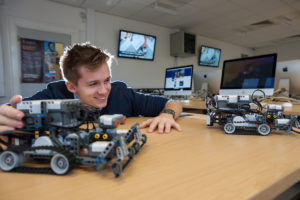Course overview
Computer Science is a broad area which includes designing and building hardware and software systems for a wide range of purposes and processing, structuring and managing various kinds of information.
Covering all aspects of computer science, including the underlying principles and theory, this programme will ensure that when you graduate you will know what is and isn’t possible with computers and be able to find solutions to the problems you will encounter in your professional life.
The programme covers a range of compulsory modules including: Database Development, Software Engineering, Complexity of Algorithms, a second year group software project and a final year individual project.
You then choose from a selection of modules representing the most cutting-edge areas of computer science today. These cover topics such as Artificial Intelligence, Data Science, Cyber Security, Robotics, Computer Networks, and High-Performance Computing, amongst others.
You can choose to maintain a mixture of modules throughout your Computer Science degree or follow a specialist pathway in Artificial Intelligence, Algorithms and Optimisation, Data Science, or Cyber Security.
Why choose Computer Science at the University of Liverpool?
Learn from world-leading researchers, including Professor Charlie Yang (IEEE Fellow in Robotics), Professor Rahul Savani, and Professor Xiaowei Huang, who are pioneers in their respective fields.
Accreditation
Accredited by BCS, so opens up a wide variety of career opportunities with excellent employment prospects.









